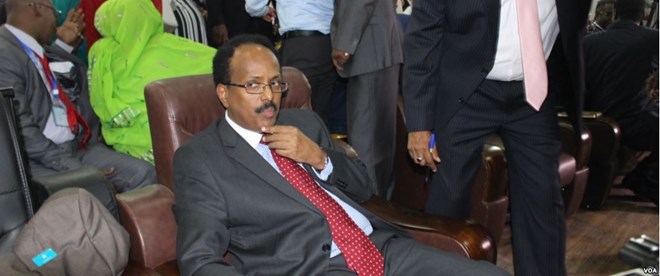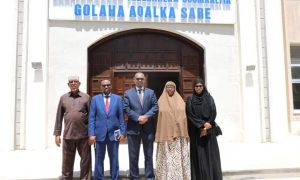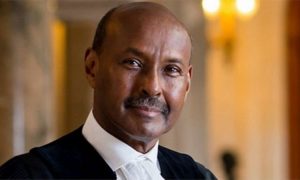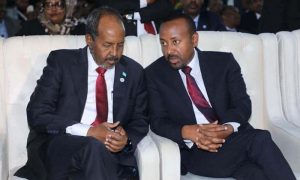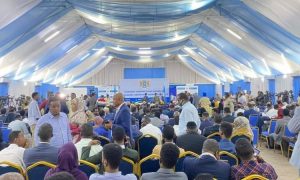
December 25, 2017 | By Mahad Gelle – Through a tumultuous first ten months as president of Somalia, Mohamed Abdullahi Farmajo is facing an ominous rumble of discontent driven by a mixture of anxiety, anger, frustration and political opportunism.
In the past two months, an assortment of new opposition groups has emerged, some with noble – sounding names and political agendas, led by an improbable collection of bad or good leaders, Federal Member States President, disaffected public appointees and young professionals. Even an ex Somali Prime Minister has joined the fray with a new, pointedly non-leftist forum called the “Talo – Wadaag Forum.”
Their demands include individual grievances, and several of the more controversial leaders have grabbed most of the attention. But their broader message is remarkably similar: The government of President Mohamed Abdullahi Farmajo has failed to protect the public and provide national leadership. The president has overreached his executive powers and excluded diverse points of view. He must act now, produce meaningful reforms and legitimize his fractured, teetering government — or else.
The Prime Minister is the losing edge of the game. In the name of fighting corruption, Prime Minister Hassan Ali Khayre is bringing millions of dollars in procurement deals under his direct purview, denying ministries the opportunity to contract their own goods and services. The best example is the resignation of Maryam Qasim Ahmed, Minister for Humanitarian Affairs and Disaster Management, citing the corruption and lack of coordination within the government, particularly the Office of the Somali Prime Minister.
And staff members under Mr. Khayre’s authority are even directly writing and carrying out policy for the government, leaving some ministry officials wondering what their jobs are anymore, some officials say, speaking on the condition of anonymity to avoid angering the Prime Minister.
Still, the Somali Prime Minister has not managed to move aggressively on some tenets of his anticorruption campaign — although often in ways that have rankled rather than assured.
What is the way out then?
Success in Somalia requires a firm Presidential Leadership, not half – measures. President Farmajo soon must make one of his most important national security decisions: how to proceed in Somalia, a crucial theater in the war against Al Shabaab. This week the President received the Operational Readiness Assessments of the war from the recently appointed commander of SNA with the AMISOM and international partners support.
While the details of this report remain classified, it is believed to set the framework for an expanded military effort within a new counterinsurgency strategy that puts a premium on protecting the Somali people from Al Shabaab terrorism and intimidation. To protect vital national interests by defeating Al Shabaab, President Farmajo must give his military commanders the best chance for success – not accede to advisers motivated by political expediency who would disturbthe process and abandon the President new Somalia strategy before it can be implemented.
Putting Somalia on the Right Path
Social and political reconciliation is the only path to peace in Somalia. The Somali people can have a bright future, but it has to start with social and political reconciliation first. This is the routine carnage wreaking havoc across Somalia. But after 27 years of civil war and weak institutions, it is clear that we need a new strategy, one that enfranchises all groups in Somalia – with a view to build a truly viable and lasting democracy.
Reconciliation has only recently been recognized as a necessary component of post-violence reconstruction. Evidence and experience are still being accumulated in different parts in Africa– including Rwanda and Sierra Leona or even South Africa.
Success will depend largely on whether the Somali Federal Government can dramatically improve its performance, communicate effectively to its people and provide relationship oftrust and better security and military effectiveness.
Open Peace Talks With ‘Moderate’ Al Shabaab
Efforts to negotiate with the Al Shabaab have evolved since 2013 when talks with Al Shabaab moderates were first proposed.
Even after 10 years of war, the Al Shabaab remains undefeated according to President Farmajo himself. This also demonstrates clearly according to the recent report released by the United Nations Assistance Mission in Somalia (UNSOM),which covers between the period from 1 January 2016 to 14 October 2017, 4,585 deaths and injuries happened in Somalia, 60 percent of which were attributed to Al Shabaab.
The October 14 tragedy in Mogadishumust shape the President’s leadership to safethe lives of ordinary Somalis. If not, the death and destruction of innocent Somalis will keep rising. Prolonging or escalating the conflict will almost certainly have humanitarian consequences, including an increase in civilian casualties and refugee flows.
Conclusions
Time will tell if, what President. Farmajo said at his inauguration ceremony on February 22, 2017 were sincere and true – that he‘’will return the lost confidence between the government and the people, and promises for the Somalis and the world that his government will change the perception that Somalia is a corrupted nation’’.
.
Mahad Gelle
Email: mahadgeelle@gmail.com
.
.
Xafiiska Wararka Qaranimo Online | Muqdisho
_______________________________________________
_____________________________________________________________________________________Xafiiska Wararka Qaranimo Online | Mogadishu, Somalia
_____________________________________________________________________________________Advertisement
_____________________________________________________________________________________


